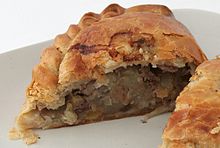Pastygate

Pastygate is the name given to a political scandal in the United Kingdom in March 2012. The government had said that it was going to place a 20% VAT charge on hot pasties.
A Labour Member of Parliament asked the Chancellor of the Exchequer, Conservative MP George Osborne, about when he last ate a Cornish pasty. Osborne answered that he had no idea when he had last eaten one. This answer has been used to show how out of touch with ordinary people the Conservative party had become. The Prime Minister David Cameron later said that he had recently eaten a Cornish pasty at Leeds railway station "and that it was very good". However, The Sun newspaper then reported[1] that there was no place to buy Cornish pasties at Leeds railway station at the time David Cameron claimed to have eaten one there.
The issue, which at first appeared to be unimportant, was then taken up by several other newspapers and political commentators. They pointed out that the Conservatives seemed not to know that the pasty was a basic food eaten by many ordinary people in the country. The VAT rise on the pasty would affect both these customers and the pasty industry itself. These newspapers and commentators made fun of David Cameron's attempt to show himself as a regular pasty eater [2](i.e. as one of the people) and that George Osborne's did not know what a pasty was.[3]
References[change | change source]
- ↑ Dunn and Steve Hawkes, Tom Newton (29 March 2012). "David Cameron branded a pie plonker and a fuel fool over his handling of Pasty Tax storm and the theatened fuel tanker drivers' strike". thesun.co.uk. Retrieved 30 March 2012.
- ↑ "Pastygate: Westminster row over whether Tories eat bakery products rumbles on.. - The Daily Record". Daily Record. Glasgow: Trinity Mirror. 29 March 2012. ISSN 0956-8069. OCLC 500344244. Retrieved 30 March 2012.
- ↑ Delingpole, James (29 March 2012). "What Pastygate tells us about Cameron's Conservatives – Telegraph Blogs". blogs.telegraph.co.uk. Archived from the original on 6 April 2016. Retrieved 30 March 2012.
